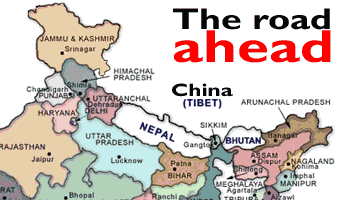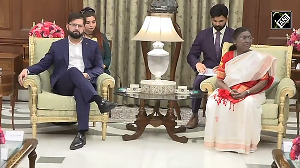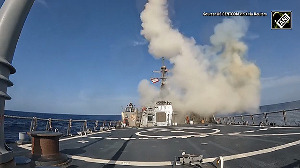
Part I: Future friends?
At the height of the border conflict, on November 14, 1962, the Indian Parliament passed a unanimous resolution stating that India will recover every inch of territory lost to the Chinese, 'howsoever long or hard the struggle may be!'
After the conflict, India embarked on major military modernisation and development of communications on the Himalayan border. But despite the parliamentary resolution, in the last 43 years, India has taken no offensive action against China.
China continues to occupy areas claimed by it in Aksai Chin area, but not anywhere else, including the Arunachal border despite its claim to the entire state. Nor has China taken any offensive action on this claim.
While the border remained peaceful, the relations between India and China went into a deep freeze right till 1986.
India-China: Neither friends nor enemies
First the two countries found themselves on the opposite side of the fence in intra Communist feud between the erstwhile Soviet Union and China. Later, as a tacit alliance between the US and China came into existence, India found itself firmly in the Soviet camp, more out of compulsion than choice.
The US-China front versus Indo-Soviet front also spawned policies in the Indian subcontinent that engendered nuclear and missile proliferation to the detriment of Indian security. The border dispute as conflict over land receded and it became a political dispute between India and China with wider regional and global ramifications. India responded to this challenge by developing its own nuclear and missile capability.
The Chinese liberalised their economy in the late 1980s while India began this process only in 1991. Chinese economic progress was spectacular and India has only lately begun to catch up. Despite the political dispute, India and China began to expand bilateral trade, with annual trade reaching $ 3-15 billion by 2004.
The Cold War ended in 1992 with the collapse of Communism in the Soviet Union and the end of the Russian empire. It would not be an exaggeration to say that very few countries had anticipated this and the world was slow to change. Since the demise of the Soviet Union was not anticipated, countries around the world, including China, had fashioned their long term policies on that basis.
The current state of relations between India and China does not cater to the shift in global economic balance from Europe to Asia. It is also certain that the shift in economic balance will be followed by the changes in military balance that would then impact on the world's geo-politics.
It is natural to expect that this change will be resisted though various means by the existing power/powers. If India and China could mend fences, it would be possible to face this challenge and maintain world peace, so necessary for the progress of both nations.
Colonel John Taylor on life on the Chinese border
If India and China both see mutual advantage in friendly relations in future, then the first step has to be to deal with the border dispute.
At the popular perception level, it is necessary to have 'closure' of the memories of war. This could be achieved by both the countries expressing 'regret' for the 1962 border war that took place due to misunderstanding, misperceptions and brinkmanship. A public declaration that both countries wish to put the past firmly behind would then set the stage for resolution of the border dispute.
The India-China border dispute has to be seen in context of the Himalayan kingdoms as well as relations of both the countries with other peripheral powers in the region. Peace on the border would only be possible if both the countries show sensitivity to each other's security concerns and avoid promoting proxies to oppose each other.
In the absence of this, neither would have the incentive to end the border dispute as that serves as a ready excuse to directly target each other.
India China war accidental: Galbraith
The border itself has three district parts:
- Areas bordering Arunachal Pradesh: Here while the Chinese claim the areas right up to Brahmaputra river, it not in occupation of any Indian territory. The MacMohan line that defines the border and runs along the watershed has been accepted by China in case of Myanmar.
- Central Sector that includes areas bordering Sikkim, Uttar Pradesh and Himachal Pradesh: In these areas as well there is no major dispute about the border alignment and the Chinese also do not lay claim to any areas. There is however a dispute regarding the status of Sikkim.
- Aksai Chin area: Here the Chinese are in occupation of sizable areas that India claims as its own. However the Chinese are satisfied with the areas they control as that serves their strategic need for a road link between Sin Kiang and Tibet.
As the dispute over Aksai Chin may encounter legal hurdles on the Indian side, it could well be 'frozen' for the next 100 years and Actual Ground Position Line (AGPL) jointly demarcated and accepted by both the sides.
The border in the central sector and in Arunachal could be dealt with separately and jointly accepted by both sides as the International Border. To avoid unnecessary confrontation (like the one at Sumrodongchu in 1986-87) both sides could agree for demilitarisation and also permit each other's nationals, specially graziers, a limited access.
The essential principle is that finalisation of border in other areas should be delinked from the dispute over Aksai Chin.
Closure of the 1962 conflict and demarcation/freeze on border dispute would lay the foundations for friendly and peaceful relations between the two great countries of India and China and be a guarantee for peace in the 'Asian Century.'
Earlier in this series:Chinese ogre has a giant appetite
Complete coverage: Wen Jiabao's visit to India







 © 2025
© 2025